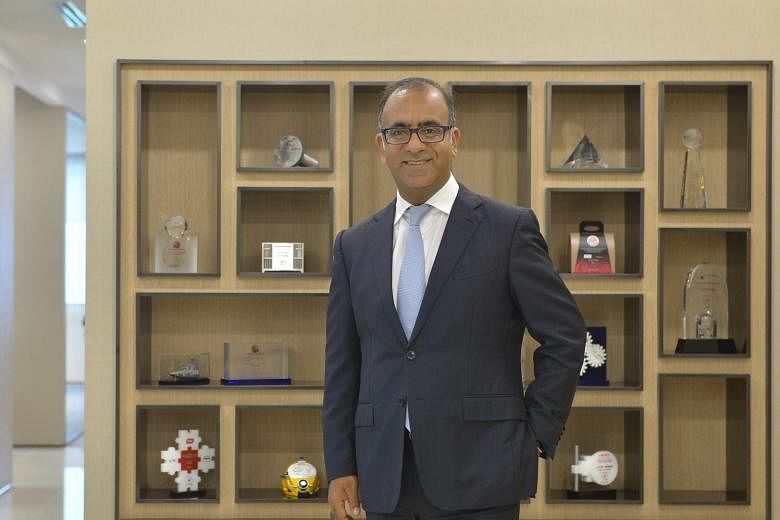The surging appetite in the region for big mergers and acquisitions (M&As) is creating exciting opportunities for boutique financial advisers - and giving them the chance to tweak the noses of the big banks in the process.
There is now strong demand on both the buy and sell sides as stock market volatility has pushed down valuations while private equity funds are piling in on growth businesses, industry players told The Straits Times.
All this is unfolding against a backdrop where big investment banks are increasingly seen as loyal to sales instead of clients, Rippledot Capital said.
The Singapore-based firm has grabbed headlines on the M&A scene as the adviser to the private equity shareholders of the local engineering firm Interplex on its $461 million sale to Baring Private Equity in March, and on Kirin's US$560 million (about S$754 million) takeover of Myanmar Brewery last August.
"In our last financial year, revenue was $21 million, up from the $5 million we had in 2011, when we first started. With growing demand our team size also doubled to 12 people over the past 12 months," Rippledot chief executive Atin Kukreja said.
The former Macquarie Capital senior managing director noted that the boom Rippledot is riding on marks the latest phase of the Asian corporate cycle.
"On the demand side, there has been a lot of private equity money being raised for Asian assets since the Lehman Brothers crisis. In the period since, corporate balance sheets have also recovered and that creates appetite for business acquisitions."
The sell side is also being pushed by weak stock prices to seek capital off the public market.
"In the past, a lot of Singapore companies went public because it was fashionable to be called the chairman of a listed firm. But in downturn after downturn, they are starting to ask themselves - why am I listed when there's no liquidity and no proper value to be had?" Mr Kukreja said.
That trend can be seen in Osim founder Ron Sim's March bid to delist his firm while Eu Yan Sang is being acquired by a consortium led by company honcho Richard Eu and Temasek Holdings unit Blanca Investments.
Rippledot is advising another local engineering firm, Innovalues, on a potential deal. "Watch this space over the next few months," Mr Kukreja said, adding that his firm's pipeline for this year is significantly more active than in previous years.
Dealogic data showed that the M&A volume in South-east Asia has reached US$40.53 billion (S$54.5 billion) so far this year, up 34.2 per cent from US$30.21 billion in the same period last year.
Evercore Asia, another independent investment banking firm here, is also optimistic. Its United States parent is a major M&A adviser in its home market, but in South-east Asia it started only in 2014.
"In 2015 we did $40 billion worth of deals, and this year, while the aggregate deal size may not be as large, we expect a bigger number of transactions spanning real estate, natural resources and consumer sectors," Evercore Asia chief executive Keith Magnus said.
The independent and boutique players like Rippledot and Evercore Asia are able to compete for market share against global investment banks because of trust issues, said Mr Magnus, who was formerly UBS Investment Banking regional chairman, as well as country investment head of Deutsche Bank and Merrill Lynch in Singapore and Malaysia.
"There's a lot of lethargy and scepticism towards the large banks, especially after the last financial crisis. It became apparent that there's a huge conflict of interest within different units of these banks," he added.
"For instance, emerging from the crisis it was clear that the investment banking units were selling toxic assets to private banking clients, or a deal is advised because the bank wants to deploy its balance sheet. All that takes away the objectivity that the tycoons and clients need to have."
Mr Kukreja was equally critical: "We see the traditional investment banking model breaking apart.
"If you look at the big investment banks, a large part of the remuneration comes in the form of year-end bonuses, which is a black box to even the employees.
"When you have that model, it's difficult to get people working as a team, especially when markets dislocate in a financial crisis-type event. The loyalty to the clients is just not there."
To avoid that situation, Rippledot has "100 per cent transparency" on remuneration, which Mr Kukreja said is a rare practice in his industry.
Another advantage is that firms like his have a client-first approach that big banks can't have due to balance sheet and earnings concerns.
His personal highlight deal - advising Singapore-based container firm Goodpack on its $1.4 billion acquisition by KKR Asian II Fund - was the result of a relationship with the firm lasting more than five years, Mr Kukreja noted.
But the spokesman of a major Swiss international bank, which declined to be named, shrugged off the notion that established banks are being upstaged: "It's not true that we can't serve our clients well. We have larger teams, a global network, a larger client base and greater financing capability. These are all the advantages we have and they don't.
"We don't feel any pressure from the smaller advisers as there is enough space in the market for us to coexist."


